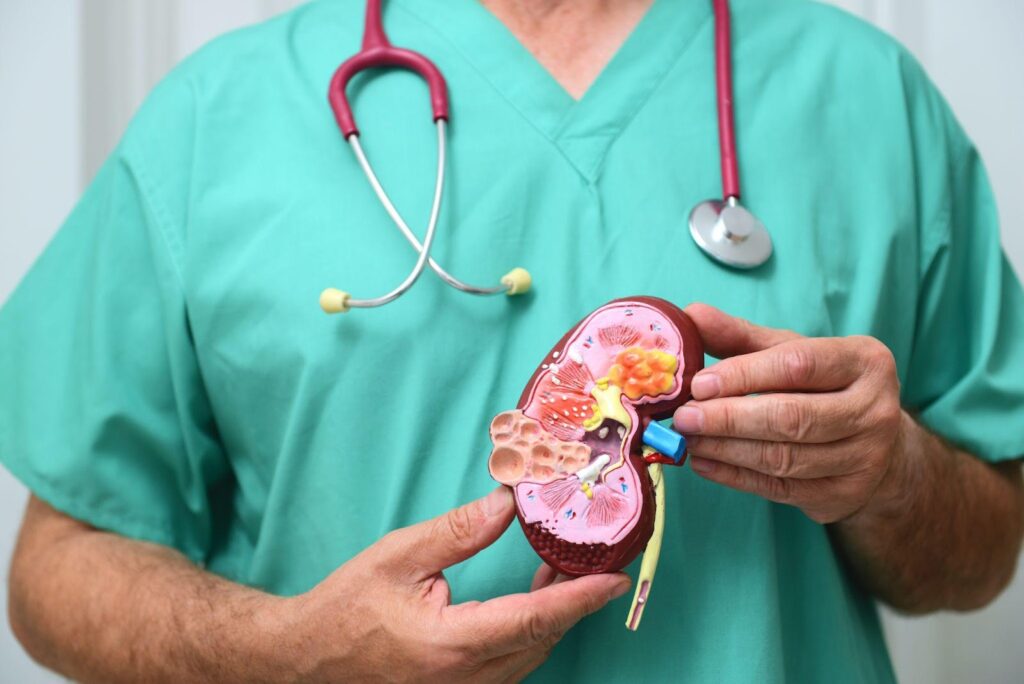
Kidney cancer, a disease characterized by the abnormal growth of cells in the kidneys, can often go undetected in its early stages. This comprehensive guide promotes kidney cancer awareness, empowering individuals with knowledge about symptoms, risk factors, and available treatment options.
Recognizing the Silent Symptoms of Kidney Cancer
Kidney cancer often progresses silently, with symptoms typically manifesting in later stages. However, vigilance about potential indicators can prove invaluable in early detection and treatment. Some common symptoms associated with kidney cancer include:
- Blood in Urine (Hematuria): Pink, red, or cola-colored urine may signal kidney cancer, though other causes like infections or stones exist. Seek medical advice.
- Persistent Pain in the Back or Side: A dull, aching pain below the ribs that doesn’t go away could be an early warning sign.
- Palpable Lump in the Abdomen or Side: A doctor should evaluate a noticeable mass in the abdomen or side.
- Unexplained Weight Loss: Sudden, unexplained weight loss and loss of appetite may indicate an underlying issue.
- Fatigue: Persistent tiredness, even with rest, can be a red flag.
- Loss of Appetite: A sudden decrease in appetite, especially with other symptoms, should not be ignored.
- Anemia: Low red blood cell count can cause weakness, fatigue, and shortness of breath due to reduced erythropoietin production.
It’s important to emphasize that these symptoms can also arise from other, less severe conditions. However, experiencing these symptoms necessitates immediate medical consultation for accurate diagnosis and appropriate management. Early detection significantly increases the chances of successful treatment and survival.
Unraveling the Risk Factors
While the exact causes of kidney cancer remain unclear, several risk factors can increase its likelihood. Smoking is a major risk, as harmful chemicals in cigarettes can damage kidney cells. Obesity and high blood pressure also contribute by causing metabolic changes and increased kidney strain. Genetics plays a role, with those having a family history or conditions like von Hippel-Lindau disease facing higher risks.
Additionally, exposure to chemicals such as asbestos and cadmium, as well as aging, further elevate the chances of developing kidney cancer. Understanding these risk factors can help individuals make informed health choices. Maintaining a healthy weight, managing blood pressure, and avoiding smoking or hazardous substances can reduce the risk. If you have a family history of kidney cancer, consulting a doctor for regular check-ups is advisable.
Navigating Treatment Options
Kidney cancer treatment depends on the cancer stage, overall health, and patient preferences. A healthcare team creates a personalized plan, often involving surgery to remove part or all of the kidney, radiation therapy to shrink tumors or eliminate remaining cells, immunotherapy to enhance the immune response, and targeted therapy to block cancer growth pathways.
Early Detection Saves Lives
Kidney cancer awareness promotes early detection and improves treatment outcomes. By understanding the symptoms, recognizing risk factors, and seeking prompt medical attention, individuals can significantly increase their chances of successful treatment and long-term survival. Regular medical checkups and open communication with healthcare providers are crucial for early detection and timely intervention.
Don’t wait for symptoms to appear. Take charge of your health today. If you are experiencing any of the symptoms mentioned or have concerns about your risk factors, schedule a consultation with our doctors to discuss kidney cancer screening and prevention.


 Powered by
Powered by